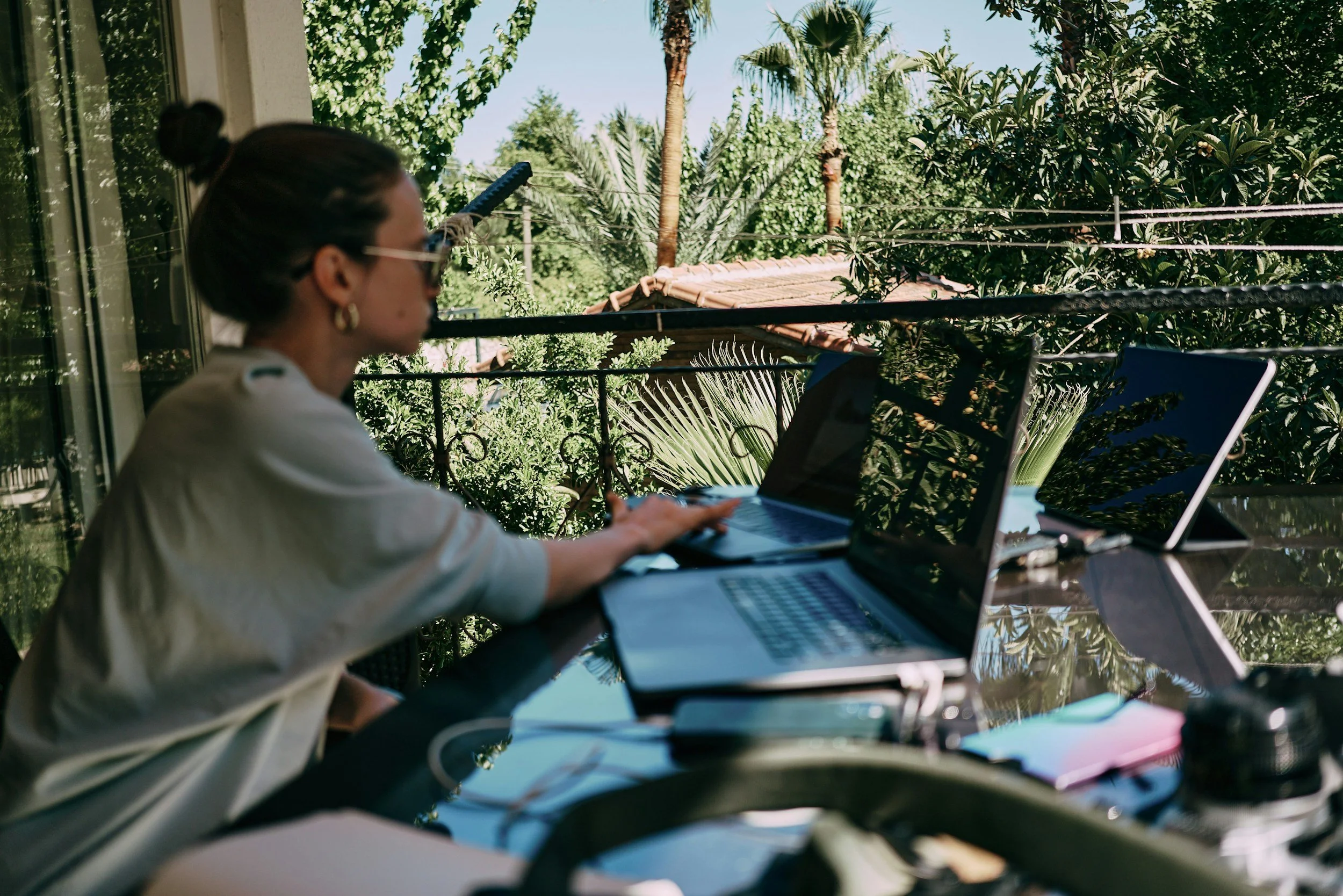How Indonesia's island paradise became the remote work capital of Southeast Asia
Beneath Bali's swaying palms, a quiet revolution unfolds. Fiber-optic cables snake through ancient villages, connecting traditional warungs to global networks. Here, remote work infrastructure blooms without sacrificing beauty.
The first hint that something has shifted in Bali comes not from the familiar hum of motorbikes weaving through Canggu's narrow lanes, but from the soft clicking of laptop keyboards drifting from every café, villa, and beachside warung. Where once the island's morning soundtrack was dominated by roosters and temple bells, today it's punctuated by the unmistakable sounds of video calls beginning as the sun rises over the rice terraces.
This transformation didn't happen overnight. Bali has quietly evolved from a backpacker haven and luxury resort destination into something far more intriguing: a proving ground for the future of work. Here, among the frangipani-scented air and swaying palms, a new infrastructure is taking shape—one that suggests remote work needn't mean sacrificing beauty, community, or inspiration.
The Invisible Revolution
Walk into Dojo Bali on any given Tuesday morning and you'll find French graphic designers sharing tables with Australian startup founders, while a group of German consultants debate strategy over flat whites. The space itself—housed in a converted villa with soaring bamboo ceilings and tropical gardens—feels more like a cultured friend's home than a sterile office block. Yet the WiFi here regularly hits 300 Mbps, faster than most London offices.
This is the paradox of Bali's remote work revolution: it's built on infrastructure so seamlessly integrated that visitors barely notice it exists. Fiber-optic cables snake beneath centuries-old villages, connecting traditional warungs to global networks. Outpost in Ubud occupies a modern complex that feels at home among the surrounding rice paddies, while Tropical Nomad in Canggu offers meeting pods that open directly onto lush gardens.
The island's coworking pioneers understood early that atmosphere matters as much as bandwidth. These aren't tech campuses dropped into paradise; they're spaces designed to honor Bali's natural rhythms while serving digital demands. Workshops on mindfulness sit alongside seminars on cryptocurrency. Yoga sessions flow into networking events.
Beyond the Office
But Bali's real innovation lies in how it's reimagined the relationship between work and life. The island has spawned a network of coliving spaces that treat remote work as just one part of a fuller existence. These aren't hostels with WiFi bolted on, but thoughtfully designed communities where residents might start their day with sunrise surf sessions, conduct client calls from poolside cabanas, and end with communal dinners featuring ingredients from local markets.
The model works because it acknowledges something corporate offices have long ignored: creativity and productivity flourish when work feels integrated rather than isolated. Here, a conference call might be followed by a motorbike ride through emerald terraces, or an afternoon of coding might transition seamlessly into a cooking class with neighbors.
Policy Meets Paradise
What elevates Bali beyond mere lifestyle experiment is Indonesia's recognition that remote work represents genuine economic opportunity. The introduction of Digital Nomad Visas and Remote Worker KITAS permits—allowing stays of up to five years without Indonesian tax obligations for offshore income—signals a government that grasps the new economy's contours.
This isn't just bureaucratic box-ticking; it's a strategic bet on a post-pandemic world where location and career need not be synonymous. While other destinations offer sunshine and beaches, Bali provides legal clarity and long-term stability for digital professionals seeking to build something lasting.
The Sensory Infrastructure
Perhaps most remarkable is how Bali has maintained its essential character while adapting to new realities. The island's natural infrastructure—those volcanic slopes, terraced valleys, and endless coastlines—serves as more than scenic backdrop. These landscapes function as active components in the remote work ecosystem, providing the mental space and physical restoration that cramped urban offices can't offer.
Morning walks through mist-shrouded villages become informal brainstorming sessions. Afternoon breaks at hidden beaches serve as natural reset buttons between intense work periods. The island's abundant wellness culture—from meditation retreats to world-class spas—offers infrastructure for mental health that most cities struggle to provide.
Growing Pains and Future Horizons
This transformation hasn't been without challenges. Seasonal internet slowdowns still frustrate during heavy rains, and power outages occasionally interrupt important calls. Some beachside locations remain connectivity dead zones, pushing development inland and northward to emerging hubs beyond the traditional southern coast hotspots.
Yet these growing pains feel manageable compared to the infrastructure being laid for tomorrow. New satellite connections promise to eliminate dead zones, while renewable energy projects aim to create power independence. The upcoming expansion of regional airports will distribute visitor flows beyond current pressure points, potentially opening pristine areas like North Bali to thoughtful development.
The Bali Model
What Bali has achieved goes beyond attracting digital nomads; it has created a template for how destinations might prosper in an increasingly location-independent world. The island demonstrates that remote work infrastructure need not mean sacrificing local character or environmental beauty. Instead, it can enhance both.
The model emerging here suggests that future remote work hubs won't be generic tech enclaves, but places that offer something irreplaceable: a sense of rootedness amid mobility, community within flexibility, and inspiration built into daily routine. In Bali's case, that means volcano views during video calls, temple bells marking lunch breaks, and the knowledge that world-class surf is always just a motorbike ride away.
As evening falls and laptop screens glow against tropical twilight, it's clear that Bali hasn't just adapted to remote work—it has redefined what remote work can become when it's built on a foundation of beauty, community, and genuine cultural exchange. The island offers a preview of a future where the choice between career and lifestyle may no longer be necessary—where the infrastructure of work and the infrastructure of life become indistinguishable.
References
Bali, Indonesia & the Future of Tourism: The Rise of Digital Nomads - LinkedIn
Living in Bali as a Digital Nomad: Is It Still Worth It in 2025? - Global Wealth Protection
Bali for Digital Nomads - The Ultimate Guide (2025) - Viva Nomadia
Living in Bali: How to Work Online Legally in 2025 - Indoned
Remote Work in Bali – System Development in Indonesia's Tourist Destinations - TimeDoor


